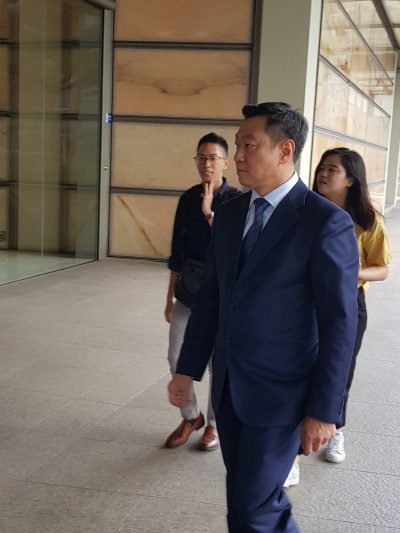How does one determine whether or not a payment is improper?
The fifth day of the Aljunied-Hougang Town Council (AHTC) trial on Oct. 11 saw the court turn its attention to accounting firm PricewaterhouseCoopers (PwC) and the claims of Pasir Ris-Punggol Town Council (PRPTC).
Senior Counsel Chelva Rajah, defence lawyer for three Workers' Party MPs and two town councillors, discussed alleged improper payments during his cross-examination of Goh Thien Phong, partner in PwC.
How did we get here?
If you'll recall, the WP won Punggol East in a by-election in 2013.
The ward was subsequently managed under the Aljunied-Hougang-Punggol East Town Council (AHPETC) from 2013 to 2015.
In 2015, the WP lost Punggol East to the PAP during the general election. AHPETC then became AHTC. Punggol East ward was next managed by PRPTC.
In 2016, PRPTC appointed PwC to look into AHTC's accounts.
In 2017, PwC released a report that alleged improper payments were made by AHPETC.
PRPTC have filed a lawsuit, claiming that decisions made by the town councillors of AHPETC caused it to suffer "loss and damage", and claims compensation.
PRPTC are represented in the trial by Drew & Napier.
If you managed to get here without being dazzled by all the acronyms, well done!
AHTC handed over documents to PRPTC
Rajah began by discussing the improper payments that PwC alleged were made by AHPETC.
PwC claimed that among others, improper payments were made out from 12 invoices which lacked supporting documents.
However, Rajah quoted from the affidavit of Vincent Koh, then-Deputy Manager of AHTC, who claimed that the supporting documents for six of those invoices had indeed been handed over to PRPTC.
Koh referred to an email exchange between himself and Kwok Wei Kin, the general manager of PRPTC.
On Dec. 1, 2015, Kwok sent him an email outlining "outstanding issues", and asked for several missing monthly service reports.
Koh replied to her email on Dec. 7, 2015, and arranged a handover of the outstanding items at 3:00 pm on Dec. 9, 2015.
On the same day, Dec. 9, 2015 at about 6:20 pm , Kwok sent Koh another email thanking him and his team for handing over the documents as listed in her earlier email.
Said Rajah:
"In other words, those monthly service reports were not, in effect, missing."
He added that it was puzzling why such allegations were raised.
In reply, Goh said that PwC began its work on Nov. 1, 2016. At the time when PwC performed their work, the supporting documents were missing.
He added that PwC had asked AHTC members for the supporting documents, but they could not be found.
Rajah then asked if Goh knew that the supporting documents were handed over to PRPTC by Koh's team. He said:
"Did someone in PRPTC tell you ‘Oh, these documents were not handed over to us, you better ask someone in AHTC?’"
Replied Goh:
"I can't remember that, Mr Rajah."
Evidence of work done
Rajah disagreed with Goh's views while discussing the other six invoices that were "missing" supporting documents.
PwC had alleged that these six invoices lacked documents for verifying that work had been done.
However, Rajah claimed that the allegation was "without basis", as documents were not required to show that work had been done satisfactorily.
Rajah discussed payments made to Propell Integrated Pte Ltd, a facilities management company, for work done during the 2015 general election.
In preparation for Polling Day, AHPETC had to complete a number of tasks, including:
- Installing rotating ceiling fans
- Installing additional lighting
- Ensuring that the polling sites were clean and free of encumbrances
- Providing ramps to the sites
- Providing additional litter bins
Propell claimed payment from the town council for performing this work, and it obtained remittance from HDB for its expenses.
Rajah asked Goh if he was aware of this, to which Goh replied that PwC required "evidence" of work done.
He said that when the payment was made, there were no documents to show that work had been done. In reply, Rajah asked:
"The fact that GE2015 has come and gone and the fact that the polling has taken place is not evidence that work was done?"
Goh repeated that there were no supporting documents, like photographs, to demonstrate that work had been done for the contractor.
 Goh outside the Supreme Court on Oct. 11, 2018. Pic by Matthias Ang.
Goh outside the Supreme Court on Oct. 11, 2018. Pic by Matthias Ang.
Letter of the law
Rajah then moved on to another issue. PwC alleged that AHPETC had made payment on 56 invoices, although they were not properly certified.
Goh explained that PwC had taken a random sample of 200 transactions. In 144 of those, the invoices had been signed by the Head of Department. The other 56 invoices were not.
Based on that, PwC took the view that invoices should be signed by the Head of Department, based on work done.
In response to a follow-up question from Rajah, Goh said that he believed Rule 56, Subsection 4C of the Town Councils Financial Rules (TCFR) had been breached in these instances.
This rule states:
"It is the responsibility of the Head of Department to satisfy himself that the prices charged are either according to contracts or approved scales, or fair and reasonable according to current local rates."
However, Rajah pointed out that the rule did not state that the Head of Department had to sign an invoice in order to comply with Rule 56, Subsection 4C.
Instead, other documents signed by the Department's Head could be used to show that a payment was proper, not just the invoice.
Goh replied that members of the town council itself were not sure, with some asserting that the Head of Department had to sign the invoice, and others saying that another officer could do it.
Based on the lack of a consistent policy by the town council, Goh maintained his position that a Head of Department had to sign the invoice in order to show that the payment was proper.
Top image adapted from Tan Rajah & Cheah and PricewaterhouseCoopers.
If you like what you read, follow us on Facebook, Instagram, Twitter and Telegram to get the latest updates.
